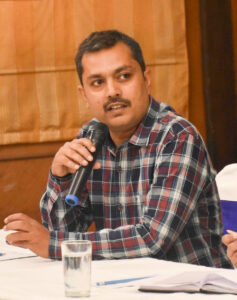Building Climate Change Resilience Among Uttar Pradesh’s Brick Kiln Workers

Ravi Shekhar
22 May 2024
Ravi Shekhar is one of the Co-Founders of The Climate Agenda and works as Campaign Strategist for the organization.
Uttar Pradesh, the leading brick producer in India, is home to approximately 22,500 brick kilns employing around two million workers, including migrants. These workers, forming an informal workforce, endure deplorable working conditions and face increasing threats from climate change. The Climate Agenda, a dedicated climate campaigning organization, has been working relentlessly to build climate resilience among this vulnerable group. This article highlights a few of the actions and their outcomes achieved under one of TCA’s current campaigns named “Buniyaad”. The campaign is aimed to ensure just technology transition within the brick kiln sector of Uttar Pradesh and I am trying to highlight here the direction we have taken to safeguard and improve the livelihoods of brick kiln workers amidst escalating climate challenges. “Buniyaad” is contributed and strengthened by the presence of multiple Partners including Purpose and Chambal Media, IIT Kanpur, IIT BHU whereas The Climate Agenda is a strategic Partner in this coalition leading from the front.
The Importance of Building Climate Resilience
Building climate resilience among brick kiln workers is crucial, as demonstrated by similar efforts in other industries with equally challenging conditions. For instance, agricultural workers, who often labor in extreme weather and unstable environments, benefit significantly from resilience initiatives such as improved irrigation techniques and access to climate-resistant crops, crop insurance etc. Similarly, construction workers in urban areas face heightened risks from heatwaves and pollution. Efforts to provide cooling shelters, better protective gear, health services and economic security have proven essential in safeguarding their well-being. These examples underscore the importance of proactive measures to protect Workers from climate change related vulnerabilities, ensuring they can adapt and thrive despite the increasing severity of climate change adverse impacts.
The State of the Brick Kiln Workforce
The brick kiln industry in Uttar Pradesh has long been characterized by harsh working conditions, including unsafe work environments, poor living arrangements, lack of educational facilities for children, and inadequate provisions for women workers. Migrant workers, who constitute about 80% of the workforce, suffer the most. The absence of formal representation leaves them without a platform to voice their concerns or seek redress. Extreme weather events, such as heatwaves, flash floods and erratic and torrential rains, exacerbate [intensify] their vulnerabilities, causing monetary and health losses and, at times, loss of lives.
Multi-Stakeholder Collaboration
To address these pressing issues, The Climate Agenda has established a multi-stakeholder platform involving kiln owners, workers, government officials, and non-governmental organizations. This platform fosters collaboration and collective problem-solving, focusing on improving the working and living conditions of kiln workers while enhancing their resilience to climate change.
Bridging Policy Gaps and Enhancing Welfare Access
One significant challenge is the limited access of kiln workers to welfare schemes administered by the Labour Ministry of Uttar Pradesh through the Building and Other Construction Workers (BOCW) Board. Due to the lack of representation and seasonal nature of work, kiln workers have never been benefitted from these schemes. The Climate Agenda has initiated a groundbreaking collaboration with the MGNREGA Union, which has a strong presence nationwide. By organizing three welfare workshops across different regions, The Climate Agenda has enabled the MGNREGA Union to start registration camps for kiln workers in Central and Eastern Uttar Pradesh. This initiative bridges the gap in policy access and provides much-needed representation for the workers.
Addressing the Needs of Migrant Workers
Migrant workers face additional challenges as the administrative framework of BOCW schemes does not universally cover out-of-state migrants. In response, The Climate Agenda has been working closely with the State Labor Ministry to create a specific-purpose vehicle (SPV) through a formal MoU. This SPV aims to find out ways to extend policy coverage to migrant workers, ensuring they receive the necessary protections and benefits at their worksites.
Skill Development and Future Readiness
With the industry transitioning to more climate-friendly technologies, there is an urgent need to upskill the workforce. The Climate Agenda, in collaboration with the State Skill Building Department, is addressing this need by providing targeted training programs. These programs are designed to equip workers with the skills required for new technologies, ensuring their job security and enhancing their capacity to adapt to future industry changes.
Enhancing Climate Resilience
The Climate Agenda’s initiatives are fundamentally about building climate resilience among the brick kiln workforce. Our efforts to upskill workers are crucial actions that not only safeguard their jobs but also provide greater safety at the workplace. By asking the government to universalize BOCW schemes, we aim to build resilience within the community, ensuring that all workers, including migrants, have access to social safety nets. Registering local and in-state migrants with BOCW schemes enhances the social safety net, offering protections that increase security for all workers, including women. These comprehensive efforts help workers better withstand the impacts of climate change, improve their overall quality of life, and strengthen their ability to adapt to future challenges.
Conclusion
The Climate Agenda’s efforts to build climate resilience among the brick kiln workers of Uttar Pradesh are transforming the lives of this massive informal workforce. By addressing long-standing issues and fostering collaborative solutions, the organization is setting an exemplary model for climate resilience initiatives worldwide. These efforts not only improve the immediate conditions for workers but also equip them to face future climate challenges with greater strength and security. The progress achieved in Uttar Pradesh serves as a beacon of hope and a practical guide for other regions and industries seeking to protect their most vulnerable workers in the face of climate change.
